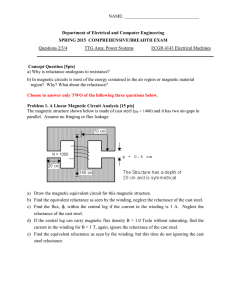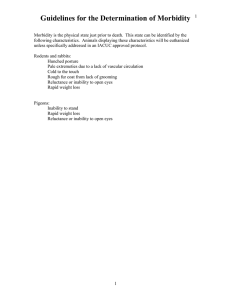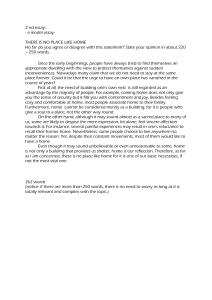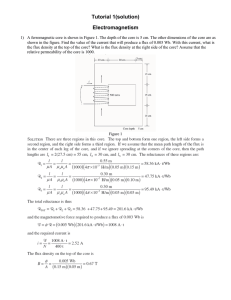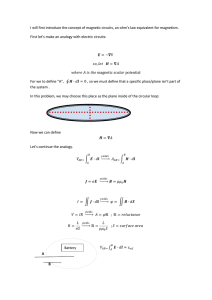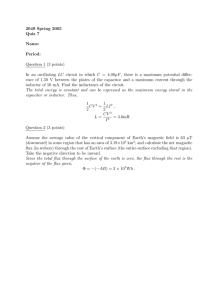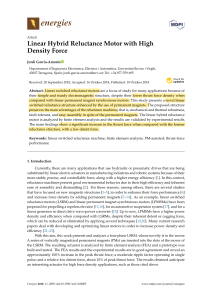Ferromagnetic Core Flux Calculation Solutions
advertisement
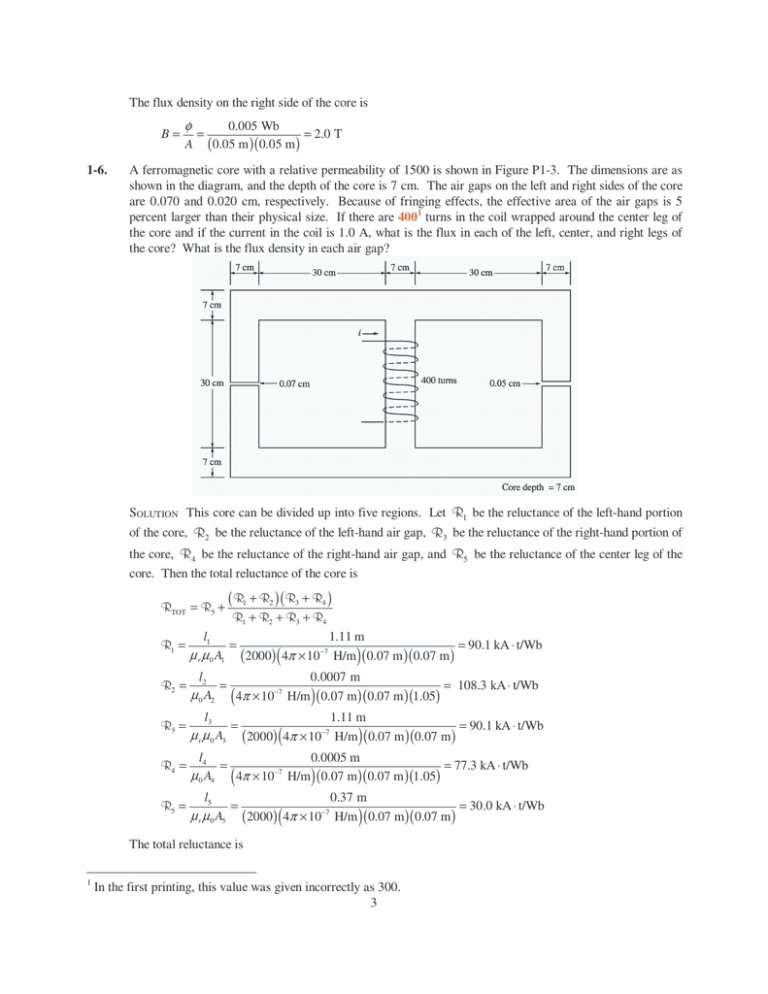
The flux density on the right side of the core is B= 1-6. φ A = 0.005 Wb = 2.0 T (0.05 m )(0.05 m) A ferromagnetic core with a relative permeability of 1500 is shown in Figure P1-3. The dimensions are as shown in the diagram, and the depth of the core is 7 cm. The air gaps on the left and right sides of the core are 0.070 and 0.020 cm, respectively. Because of fringing effects, the effective area of the air gaps is 5 percent larger than their physical size. If there are 4001 turns in the coil wrapped around the center leg of the core and if the current in the coil is 1.0 A, what is the flux in each of the left, center, and right legs of the core? What is the flux density in each air gap? SOLUTION This core can be divided up into five regions. Let R1 be the reluctance of the left-hand portion of the core, R2 be the reluctance of the left-hand air gap, R3 be the reluctance of the right-hand portion of the core, R4 be the reluctance of the right-hand air gap, and R5 be the reluctance of the center leg of the core. Then the total reluctance of the core is RTOT = R5 + R1 = R2 = R3 = R4 = R5 = l1 µ r µ0 A1 ( R1 + R2 ) ( R3 + R4 ) R1 + R2 + R3 + R4 = 1.11 m = 90.1 kA ⋅ t/Wb (2000) 4π × 10 H/m (0.07 m )(0.07 m ) ( −7 ) l2 0.0007 m = = 108.3 kA ⋅ t/Wb −7 µ0 A2 4π × 10 H/m ( 0.07 m)(0.07 m )(1.05) ( l3 µr µ0 A3 = ) 1.11 m = 90.1 kA ⋅ t/Wb (2000) 4π × 10 H/m (0.07 m )(0.07 m) ( −7 ) l4 0.0005 m = = 77.3 kA ⋅ t/Wb −7 µ0 A4 4π × 10 H/m (0.07 m )( 0.07 m )(1.05) ( l5 µr µ0 A5 = ) 0.37 m = 30.0 kA ⋅ t/Wb (2000) 4π × 10 H/m (0.07 m)(0.07 m ) ( −7 ) The total reluctance is 1 In the first printing, this value was given incorrectly as 300. 3 RTOT = R5 + ( R1 + R2 ) ( R3 + R4 ) = 30.0 + (90.1 + 108.3)(90.1 + 77.3) = 120.8 kA ⋅ t/Wb R1 + R2 + R3 + R4 90.1 + 108.3 + 90.1 + 77.3 The total flux in the core is equal to the flux in the center leg: φcenter = φTOT = (400 t )(1.0 A ) = 0.0033 Wb F = RTOT 120.8 kA ⋅ t/Wb The fluxes in the left and right legs can be found by the “flux divider rule”, which is analogous to the current divider rule. φleft = ( R3 + R4 ) R1 + R2 + R3 + R4 ( R1 + R2 ) φ right = φTOT = R1 + R2 + R3 + R4 (90.1 + 77.3) 90.1 + 108.3 + 90.1 + 77.3 φTOT = (90.1 + 108.3) (0.0033 Wb) = 0.00193 Wb 90.1 + 108.3 + 90.1 + 77.3 (0.0033 Wb) = 0.00229 Wb The flux density in the air gaps can be determined from the equation φ = BA : Bleft = φleft Bright = 1-7. Aeff = φ right Aeff 0.00193 Wb (0.07 cm )(0.07 cm )(1.05) = = 0.375 T 0.00229 Wb = 0.445 T 0.07 cm ( )(0.07 cm )(1.05) A two-legged core is shown in Figure P1-4. The winding on the left leg of the core (N1) has 400 turns, and the winding on the right (N2) has 300 turns. The coils are wound in the directions shown in the figure. If the dimensions are as shown, then what flux would be produced by currents i1 = 0.5 A and i2 = 0.75 A? Assume µ r = 1000 and constant. 4 SOLUTION The two coils on this core are would so that their magnetomotive forces are additive, so the total magnetomotive force on this core is FTOT = N1i1 + N 2i2 = ( 400 t )( 0.5 A ) + ( 300 t )(0.75 A ) = 425 A ⋅ t The total reluctance in the core is l 2.60 m RTOT = = = 92.0 kA ⋅ t/Wb −7 µ r µ0 A (1000 ) 4π × 10 H/m ( 0.15 m)( 0.15 m ) ( ) and the flux in the core is: φ= 1-8. FTOT 425 A ⋅ t = = 0.00462 Wb RTOT 92.0 kA ⋅ t/Wb A core with three legs is shown in Figure P1-5. Its depth is 5 cm, and there are 200 turns on the leftmost leg. The relative permeability of the core can be assumed to be 1500 and constant. What flux exists in each of the three legs of the core? What is the flux density in each of the legs? Assume a 4% increase in the effective area of the air gap due to fringing effects. SOLUTION This core can be divided up into four regions. Let R1 be the reluctance of the left-hand portion of the core, R2 be the reluctance of the center leg of the core, R3 be the reluctance of the center air gap, and R4 be the reluctance of the right-hand portion of the core. Then the total reluctance of the core is RTOT = R1 + R1 = R2 = R3 = R4 = l1 µ r µ0 A1 l2 µ r µ0 A2 ( R2 + R3 ) R4 R2 + R3 + R4 = 1.08 m = 127.3 kA ⋅ t/Wb (1500) 4π × 10 H/m (0.09 m )(0.05 m) = 0.34 m = 24.0 kA ⋅ t/Wb (1500) 4π × 10 H/m (0.15 m )(0.05 m) ( −7 ( −7 ) ) l3 0.0004 m = = 40.8 kA ⋅ t/Wb −7 µ0 A3 4π × 10 H/m ( 0.15 m )( 0.05 m)(1.04 ) ( l4 µ r µ0 A4 = ) 1.08 m = 127.3 kA ⋅ t/Wb (1500) 4π × 10 H/m (0.09 m)(0.05 m ) ( −7 ) The total reluctance is 5
